-
AAPL
213.43 (+0.29%)
-
BARC-LN
1205.7 (-1.46%)
-
NKE
94.05 (+0.39%)
-
CVX
152.67 (-1.00%)
-
CRM
230.27 (-2.34%)
-
INTC
30.5 (-0.87%)
-
DIS
100.16 (-0.67%)
-
DOW
55.79 (-0.82%)
The Archbishop of Canterbury has risen to the occasion
Archbishop Justin Welby has done a good job of relating the Queen’s virtues to her Christian faith. This is no easy task. The writers of the New Testament would have been very surprised by the notion that a monarch could be an exemplary Christian. And any sensible Christian leader is mindful that monarchs should be praised with care, lest religion seem cravenly reverent of tradition and worldly grandeur.
She was a model of practical virtue
In her life, he said in his official statement, ‘we saw what it means to receive the gift of life we have been given by God and – through patient, humble, selfless service – share it as a gift to others.’ This rightly puts the emphasis on her positive outlook – something most of us struggle to have. Indeed Welby himself has struggled with depression, and so his appreciation of her sense of gratitude feels heartfelt.
The emphasis on her happy disposition continues: ‘Her Late Majesty found great joy and fulfilment in the service of her people and her God, “whose service is perfect freedom”. For giving her whole life to us, and allowing her life of service to be an instrument of God’s peace among us, we owe her a debt of gratitude beyond measure.’ The quotation from the Prayer Book is significant. The greatest cultural change in her reign was the explosion of individual freedom. It’s hard to say whether it has made us a happier society. But here is a pure, unambiguous version of freedom, rooted in order.
In two broadcast interviews on Friday, he shifted the emphasis to another theme. When he last met her, in June, he told Radio 4’s Today programme: ‘I came away thinking there is someone who has no fear of death, has hope in the future, knows the rock on which she stands and that gives her strength.’ This effectively paints her as an icon of faith, but faith in a broad sense, that is fully accessible to secular minds. He also gently rebuked the individualism of our age: ‘Her attitude was “it’s not about me, it’s about what I have been called… by God to do”.’ Without labouring the point, and seeming to chide a certain younger royal, this hints that only traditional religion, not trendier versions, is fully critical of selfishness.
On BBC Breakfast he repeated the theme of living life to the full, and having rock-like confidence in God. In the Queen ‘we saw overflowing life that wasn’t just because she was Queen.’ She ‘constantly showed us the meaning of life. She was joyful, she was humorous… Her life was full but she never – even in bad moments – lost hope.’ I like the reference to ‘the meaning of life’, normally associated with pretentious philosophers puzzling over the unfathomable. She was a model of practical virtue, rooted in a positive attitude.
The republican in me wants to point out there are plenty of Christian grannies who could be lauded in similar terms, and such people will have struggled with worldly deprivations unknown to the Queen. But she had struggles and pressures unknown to the rest of us, and in a funny way that exceptionalism makes a monarch a universal figure. Because a monarch does not belong to a particular social type: he or she can represent all of us. Their inner life is more accessible, in the same way Hamlet’s high status makes him an everyman (I don’t suppose many people have compared her to Hamlet). Welby was right to imply that the monarchy has the strange power to put the spotlight on the human soul, to magnify an inner life. He delicately managed to praise her Christian faith in a way that speaks to the secular person.
King Charles’s first address as monarch in full
I speak to you today with feelings of profound sorrow. Throughout her life, Her Majesty the Queen – my beloved mother – was an inspiration and example to me and to all my family, and we owe her the most heartfelt debt any family can owe to their mother; for her love, affection, guidance, understanding and example.
Queen Elizabeth’s was a life well-lived, a promise with destiny kept, and she is mourned most deeply in her passing. That promise of lifelong service I renew to you all today.
Alongside the personal grief that all my family are feeling, we also share with so many of you in the United Kingdom, in all the countries where the Queen was head of state, in the Commonwealth and across the world, a deep sense of gratitude for the more than 70 years in which my mother, as Queen, served the people of so many nations.
In 1947, on her 21st birthday, she pledged in a broadcast from Cape Town to the Commonwealth to devote her life, whether it be short or long, to the service of her peoples.
That was more than a promise: it was a profound personal commitment which defined her whole life. She made sacrifices for duty. Her dedication and devotion as sovereign never wavered, through times of change and progress, through times of joy and celebration, and through times of sadness and loss.
I too now solemnly pledge myself, throughout the remaining time God grants me, to uphold the constitutional principles at the heart of our nation
In her life of service we saw that abiding love of tradition, together with that fearless embrace of progress, which make us great as nations. The affection, admiration and respect she inspired became the hallmark of her reign. And, as every member of my family can testify, she combined these qualities with warmth, humour and an unerring ability always to see the best in people.
I pay tribute to my mother’s memory and I honour her life of service. I know that her death brings great sadness to so many of you and I share that sense of loss, beyond measure, with you all.
When the Queen came to the throne, Britain and the world were still coping with the privations and aftermath of the second world war, and still living by the conventions of earlier times.
In the course of the last 70 years we have seen our society become one of many cultures and many faiths. The institutions of the state have changed in turn. But, through all changes and challenges, our nation and the wider family of realms – of whose talents, traditions and achievements I am so inexpressibly proud – have prospered and flourished. Our values have remained, and must remain, constant.
The role and the duties of monarchy also remain, as does the sovereign’s particular relationship and responsibility towards the Church of England – the church in which my own faith is so deeply rooted.
In that faith, and the values it inspires, I have been brought up to cherish a sense of duty to others, and to hold in the greatest respect the precious traditions, freedoms and responsibilities of our unique history and our system of parliamentary government.
As the Queen herself did with such unswerving devotion, I too now solemnly pledge myself, throughout the remaining time God grants me, to uphold the constitutional principles at the heart of our nation.
And wherever you may live in the United Kingdom, or in the realms and territories across the world, and whatever may be your background or beliefs, I shall endeavour to serve you with loyalty, respect and love, as I have throughout my life.
My life will of course change as I take up my new responsibilities. It will no longer be possible for me to give so much of my time and energies to the charities and issues for which I care so deeply. But I know this important work will go on in the trusted hands of others.
This is also a time of change for my family. I count on the loving help of my darling wife, Camilla. In recognition of her own loyal public service since our marriage 17 years ago, she becomes my Queen Consort. I know she will bring to the demands of her new role the steadfast devotion to duty on which I have come to rely so much.
As my heir, William now assumes the Scottish titles which have meant so much to me. He succeeds me as Duke of Cornwall and takes on the responsibilities for the Duchy of Cornwall which I have undertaken for more than five decades. Today, I am proud to create him Prince of Wales, Tywysog Cymru, the country whose title I have been so greatly privileged to bear during so much of my life and duty. With Catherine beside him, our new Prince and Princess of Wales will, I know, continue to inspire and lead our national conversations, helping to bring the marginal to the centre ground where vital help can be given.
I want also to express my love for Harry and Meghan as they continue to build their lives overseas. In a little over a week’s time we will come together as a nation, as a Commonwealth and indeed a global community, to lay my beloved mother to rest.
In our sorrow, let us remember and draw strength from the light of her example.
On behalf of all my family, I can only offer the most sincere and heartfelt thanks for your condolences and support.They mean more to me than I can ever possibly express.
And to my darling Mama, as you begin your last great journey to join my dear late Papa, I want simply to say this: thank you. Thank you for your love and devotion to our family and to the family of nations you have served so diligently all these years.
May flights of angels sing thee to thy rest.
King Charles addresses the nation
This evening King Charles III addressed the nation for the first time as sovereign. He reflected on his mother’s life-long service and pledged to do the same, saying: ‘As the Queen herself did with such unswerving devotion, I too now solemnly pledge myself throughout the remaining time God grants me, to uphold the constitutional principles at the heart of our nation.’
The King praised his predecessor, remarking how ‘in her life of service we saw that abiding love of tradition, together with that fearless embrace of progress, which make us great as Nations. The affection, admiration and respect she inspired became the hallmark of her reign.’ His speech also contained several interesting points of protocol: he signalled that he would no longer make political interventions and spoke warmly of ‘Harry and Meghan’ in a potential olive-branch. Prince William becomes Prince of Wales, succeeding Charles.
But it was the conclusion of the King’s address which will be most remembered, as he paid a personal tribute to his mother:
To my darling Mama, as you begin your last great journey to join my dear late Papa, I want simply to say this: thank you. Thank you for your love and devotion to our family and to the family of nations you have served so diligently all these years. May ‘flights of Angels sing thee to thy rest’.
You can watch the speech in full below, or read it here.
Why the Queen loved Balmoral
Balmoral, where Her Majesty Queen Elizabeth II passed away yesterday afternoon, was one of her favourite places to be. Queen Elizabeth inherited Queen Victoria’s love of the castle, and its surrounding estate, spending up to two months at her Highland retreat every summer throughout her long reign, with childhood visits before that.
I had the good fortune of spending five long summers at Balmoral as a former employee of the Queen, so find it easy to understand why Her Majesty loved this special area of Scotland so much. I have travelled to many countries since I left the royal household 12 years ago, but I have never seen a place as beautiful as Balmoral.
Past prime ministers have been delightfully surprised at the informality of these unstaffed barbecues which the Queen and Prince Philip hosted
The castle – set in 50,000 acres of beautiful Scottish countryside, 500 miles from the bright lights and long lenses of London – offered the Queen a rare thing: an escape from the royal bubble. It was a summer sanctuary where she could relax and unwind largely away from the public gaze. At Balmoral she could experience the ‘freedom and peace’ Queen Victoria spoke of in her Highland journals.
Queen Elizabeth spent her days there walking her beloved corgis, riding her ponies and picnicking with family, friends and guests. Past prime ministers have been delightfully surprised at the informality of these unstaffed barbecues which the Queen and Prince Philip hosted at various picnic cottages on the estate. Margaret Thatcher was horrified at the sight of her Queen doing the dishes. Tony Blair reported his shock at seeing the Queen clear and stack plates herself after lunch. Theresa May shared an anecdote in the Commons today of the time she dropped some cheese at one of these picnics. Having thought no one had noticed, she promptly put it back on the plate, turned and realised to her horror that Her Majesty was watching, smiling gently.
The Queen relished these occasions of normality away from the pomp and ceremony of her official life. Used to a life of chauffeur-driven Bentleys in London, at Balmoral – which is a private home rather than an official residence – she took to the driving seat herself, giving guests tours of the estate in her Land Rover, often driving a little faster than her passengers were comfortable with.
Queen Victoria and Prince Albert began the tradition of using Balmoral Castle as their summer holiday home after Albert purchased the estate as a gift for his wife in 1852. The previous castle on site was considered too small for their growing family, so a new castle was built in the Scottish baronial style, and completed in 1856. Victoria called it ‘my dear paradise in the Highlands’. It was here Queen Victoria retreated following the death of Prince Albert, and her spirit still looms large across the castle: its interior has been kept largely the same since Victoria’s reign, with strong traditional Scottish Highland accents throughout: tartan carpets, heather- and thistle-printed upholstery and walls lined with scenic Scottish paintings, and grand antlers from stags shot on the estate.
The Queen’s Piper played the bagpipes for her at 9 a.m. every day at all her residences (except Sandringham), another royal tradition that started with Queen Victoria. There is something particularly special about hearing these pipes in Scotland, especially in the Highlands. I have a memory – one of those of no particular occasion, but of senses of a time and a place that stick in your mind – of opening a window in the castle one September morning and hearing the pipes break the silence in the crisp Highland air and the strong smell of the Balmoral pine trees.
The simple grandeur of the rolling heather-lined hills and the peace you find there on long Highland walks (preferably with dogs in tow) are unmatched. That Her Majesty spent her final days at her beloved Balmoral will hopefully bring some comfort to the Royal family and all who mourn our gracious Queen.
Parliament’s poignant tributes to the Queen
That so many people have wanted to say something about how the Queen touched their lives, whether or not they met her, shows quite how powerful her service was. The tributes this afternoon in the House of Commons were moving because they showed the breadth of that service, from the way she carried out her constitutional duties with the government to her personal impact on many members of the House. When parliament pays tribute to someone who has just died, the cloying phrase ‘it was the House at its best’ quickly emerges. This is self-regarding, because what today’s tributes showed was not the best bits of MPs but the best bits of the Queen.
Liz Truss was the Queen’s last Prime Minister, and surely the last politician to have seen her, too, given she was only at Balmoral on Tuesday afternoon. The Prime Minister’s tribute to her was thoughtful and sincere: she spoke of the wisdom that Elizabeth II had shared with so many leaders, herself included. ‘She gave counsel to Prime Ministers and ministers across government. I have personally greatly valued her wise advice… It was just three days ago at Balmoral that she invited me to form a government and become her 15th Prime Minister. Again, she generously shared with me her deep experience of government, even in those last days.’ She described her reign as ‘dignified but not distant’, with ‘sheer humanity’ and devotion making her admired and loved across the world.
Sir Keir Starmer’s speech was still more moving. He told the chamber that ‘the loss of our Queen robs this country of its stillest point, its greatest comfort, at precisely the time we need those things most’. He spoke as much about what the Queen meant for Britons’ sense of self as he did about her impact on politics. He said:
At this moment of uncertainty, where our country feels caught between a past it cannot relive and a future yet to be revealed, we must always remember one of the great lessons of our Queen’s reign. That we are always better when we rise above the petty, the trivial, the day to day, to focus on the things that really matter. The things that unite us, rather than those which divide us. Our Elizabethan age may now be over but her legacy will live on forever.
Her special gift was to make people feel she had seen them at their best
There are some moments in the recent past that most hope are firmly behind us. Both leaders reminded the Commons that it was the Queen who had reassured us that ‘we will meet again’ in the darkest days of Covid. ‘It wasn’t simply the message that allowed a shaken nation to draw upon those reserves, it was the fact she was the messenger,’ said Starmer. ‘At the time we were most alone, at a time we had been driven apart, she held the nation close, in a way no one else could have done. For that, we say: thank you.’ The Queen, of course, mourned her husband alone at his funeral because of Covid restrictions.
As the tributes wore on, humour joined the sadness. Theresa May recalled the Queen smiling at her and pretending that nothing happened when she managed to drop some cheese on the floor during a lunch – and then replace it on the table. Harriet Harman was touched by the way the monarch had invited her to tea to thank her for her service after she had been sacked after just one year in government. Iain Duncan Smith similarly found himself with the Queen after being deposed as Tory leader, and wryly observed that she must have grown rather used to these changes.
What has run through all the speeches so far this afternoon is a profound gratitude and almost disbelieving admiration for the commitment the Queen showed to her role, but also a feeling that every member speaking really felt the Queen was theirs, as well as everyone else’s, because she had somehow moved them at some point too. Even Boris Johnson confessed he had been so moved by the prospect of her passing that he had broken down during an attempt to pre-record a tribute to her and had sent the camera crew away.
When the Queen met MPs’ constituents, it was often to praise them for making the best of themselves or their communities. Often those people were unsung, unnoticed in their work to keep people and places stitched together. But her special gift was to make those people feel she had seen them at their best. It is this memory of the Queen seeing people and the country as they wanted to be seen by her that has been the best thing so far about this afternoon’s session of the Commons.
Why even Vladimir Putin has paid tribute to the Queen
It is a mark of the Queen’s standing that even Vladimir Putin, in the midst of an undeclared economic and political war between Russia and the West, sent King Charles III his ‘deepest condolences’ after Her Majesty’s death. The Russian leader noted that:
‘The most important events in the recent history of the United Kingdom are inextricably linked with the name of Her Majesty. For many decades, Elizabeth II rightfully enjoyed the love and respect of her subjects, as well as authority on the world stage.’
Calling it a ‘heavy, irreparable loss,’ he wished the King ‘courage and perseverance’ and sent ‘the words of sincere sympathy and support to the members of the royal family and all the people of Great Britain.’
It reflects the strange Anglophilia still strikingly present in Russia
On one level, it would be easy simply to dismiss this as hypocritical cant and the meaningless language of international diplomacy. Yet that is not all there is to it. Putin may seem a radical figure, out to upend the existing global order, but in his eyes it is the West – primarily the United States – which is trying to reshape the world to its advantage and force all others to bend the knee.
In this context (and, a cynic would add, when it suits him) he considers himself fundamentally conservative. Indeed, in many ways his worldview is a very nineteenth-century one. And while Queen Elizabeth II was hardly a nineteenth century ruler, her reign did in many ways represent a sense of stability, continuity and tradition that Putin believes – whether it is true or not – he is upholding.
Elizabeth was also the first reigning British monarch ever to set foot in Russia – even though, back in the sixteenth century, Tsar Ivan the Terrible had made a (not at all successful) offer of marriage to her predecessor Elizabeth I – with her state visit of 1994. She had met Mikhail Gorbachev and Boris Yeltsin, as well as Putin when he visited the UK in 2003.
The Russian press has also been strikingly muted. The tabloid Komsomolskaya Pravda called the Queen ‘the last living titan of the 20th century’ and Moskovsky Komsomolets even ran an article exploring the connections between the British and Russian dynasties and under what circumstances Charles could become head of the Imperial Russian house. (A lot of people would have to die first, he’d have to abdicate the British throne and convert to Russian Orthodoxy, so I think it’s safe to consider this unlikely.)
Considering some of the past bilious nonsense that has come from Russian propagandists, this is all a nice change. For example, back in February, arch TV propagandist Dmitry Kiselyov was claiming that the Queen, Charles and Prince Andrew were all trying to provoke a war between Russia and Ukraine to distract attention from royal scandals.
In part, this is because even propagandists sometimes know where to draw the line. Yet it also reflects the strange Anglophilia still strikingly present in Russia. In some ways, this manifests itself as a kind of Anglophobia, a continuing (and arguably quite heartening) belief that the United Kingdom remains Russia’s most subtle and devious foe, a view that even pre-dates the machinations of the nineteenth century’s ‘Great Game’ over Persia, India, and Afghanistan. I remember a conversation with a hardline Russian thinktanker who was holding forth over how Ukraine’s 2014 ‘Revolution of Dignity’ was all actually a CIA coup when he stopped and added, ‘but it was probably MI6’s idea in the first place.’ In this perfidious view, America has the money and the muscle, but Britain the brains.
But this is just part of a wider Russian fascination with Britain that is largely positive, and takes many forms – from a respect for our education system to a voracious appetite for our culture. More thoughtful Russians even hoped that our experiences navigating the end of empire might help their own country do the same.
In that context, while it will soon be washed away by the rhetoric of war, this brief interlude of respect for the woman some Russians called ‘Baba Liza’ or ‘Granny Liz’ is a momentary reminder that whatever the anger and bitterness of the moment, the United Kingdom and Russia are also bound by ties that have endured both before.
Lessons for life from the Queen
Having taken the Queen’s remarkable longevity, good health and work ethic for granted right until the end, might her subjects now appreciate her approach to life? Because through her combination of sheer graft – she received Liz Truss to kiss hands two days before she died – and her attitudes towards health, leisure and emotional resilience, Queen Elizabeth II bestowed on us an invaluable guide to living well. The problem is that most of us haven’t spotted it.
It begins with some obvious don’ts: don’t smoke – the Queen had that lesson first-hand from her father George VI (albeit her sister Margaret didn’t listen). Don’t drink too much: she was fond of an evening martini, apparently, but was never a big drinker, even though the bar would have stayed open at royal command as long as she liked. Next there was don’t get fat: the Queen stayed impeccably trim throughout her reign, which is easier said than done, as evidenced by the millions of weight loss apps and books sold each year.
In her case, keeping fit was achieved in part by the delight she took in her hobbies, whether that was horse-riding (again something that she kept up till the end) or walking her dogs. But there was a moderation to it that many of us lack: she would never have become a gym-bunny or done an Iron Man on Dartmoor.
Keep active in body and mind. Be positive. Don’t stop working. Go to church (or at least kneel at something – hug a crystal if you want). Get a dog. Don’t whinge. Wear gloves if you like.
As well as her leisure pursuits, work also kept the Queen going, and points to another life lesson: don’t retire. Yes, it helps if you have a job that has real meaning, like being the sovereign, but whatever you do – particularly if you can reduce the hours when you need to and the work isn’t too physical – there’s pots of evidence to show that continuing to do some work in older age is good for you. Continuing to feel relevant to the community you live in is also known to be good for longevity and health. Being Queen ticks that box rather emphatically, but there are ways for the rest of us to achieve the same ends.
Underpinning all of these elements of the Queen’s life was her firm Anglican faith, of course. Lucky her, you might think, if you struggle to believe in God or anything else. But going to church is no bad thing, even for the agnostic. An hour a week giving thanks and acknowledging the good in your life – or coming to terms with the bad – is balm for the soul. You don’t have to believe in God for that, although it helps. And if the Anglican God doesn’t float your boat, there are other options available.
As the Queen demonstrated, belief in a greater being (or a greater something) helps to keep things – yourself included – in perspective, and your feet on the ground. If you ask me, this is what accounts for her much-admired humility and the fact that she didn’t take herself too seriously. That’s good advice for everyone, from high-rollers to low. It helps control the blood pressure, too.
Then there’s the Queen’s famous motto: ‘Never complain, never explain.’ If ever there was a bumper sticker waiting to happen it’s that. Perhaps it’s going on Emma Bridgewater mugs even as we speak. I hope so. Be stoic, it says; don’t catastrophise. Don’t do breakdowns on social media or start having a fit in Tesco when the machine refuses to acknowledge your bananas. In other words, choose resilience, and stick with it.
And that, as I see it, is Queen Elizabeth II’s guide to living well: keep the lard at bay, avoid the fags, keep active in body and mind. Be positive. Don’t stop working. Go to church (or at least kneel at something – hug a crystal if you want). Get a dog. Don’t whinge. Wear gloves if you like (as we discovered during Covid, PPE is a fantastic way of keeping viruses at bay). Do all of that, and who knows, if you’re lucky enough to dodge the bullets of cancer or dementia, maybe you’ll get to live a very long, happy and rewarding life, full of meaning and self-worth. Maybe you too can have the chance to meet the new Prime Minister in your final days – and smile about it, with your own teeth.
But is the Elizabethan recipe for wellbeing one that a nation that gets more obese and more anxious by the year will be likely to follow? Not a chance. Could you put it in an app? (‘Number of steps taken over boggy ground; number of pheasants’ necks wrung…’)
Alas, because all the old tweed is so unfashionable, because the buttoned-up approach to life is so out of kilter in an age of performative emoting, Queen Elizabeth II is unlikely to be hailed as a lifestyle guru. We will give centre stage to her many other achievements instead. But her fine example still stands, and we would all do well to recognise it. I think I’ll start by going for a walk.
Watch: Theresa May’s cheese tribute to the Queen
There’s a grim mood in parliament today. Across the House, MPs are queuing up to pay tribute to Her Majesty with Boris Johnson and Keir Starmer delivering two noticeably excellent speeches. But some light relief on this dark day has been offered by recollections of the Queen’s sense of humour and ability to make people feel at ease, no matter their background. And it was Theresa May who got one of the few laughs of the day when she recalled staying with the royal family at Balmoral. She told the House of a picnic she had with the late monarch:
The hampers came from the castle and we all mucked in to put the food and drink out on the table. I picked up some cheese, put it on a plate and was transferring it to the table. The cheese fell on the floor. I had a split-second decision to make. I picked up the cheese, put it on the plate and put it on the table. And I turned around to see that my every move had been watched very carefully by Her Majesty the Queen. I looked at her, she looked at me and she just smiled. And the cheese remained on it.
How we will miss her.
Watch: Boris Johnson’s tribute to the Queen
There’s a sombre mood in parliament today as MPs gather to pay tribute to the Queen. Over the following days, they will swear allegiance to the new King and share their memories and recollections of Elizabeth II. Prime Minister Liz Truss opened the proceedings in parliament, telling the House that the late monarch was one of ‘the greatest leaders the world has ever known. She was the rock on which modern Britain was built.’
Sir Keir Starmer quoted Philip Larkin and told members that ‘she did not simply reign over us, she lived alongside us.’ Then it was the turn of the Father of the House, Sir Peter Bottomley, followed by the Queen’s 14th Prime Minister Boris Johnson. He heralded the late Queen as ‘Elizabeth the Great’ and recalled how one Middle Eastern world leader actually thought she had parachuted out of a plane at the London Olympics.
The New York Times’s tasteless Queen op-ed
The Queen’s death has prompted an outpouring of mourning around the globe. But that sense of loss apparently doesn’t extend to the newsroom of the New York Times, where tragedy was inevitably greeted as an invitation for clickbait. Having previously hired the services of Russia Today’s Jonathan Pie to castigate Britain, the world’s worst newspaper has now blundered again, publishing an opinion piece on its homepage that most would regard as insensitive at best.
The piece was by Harvard academic Maya Jasanoff, titled ‘Mourn the Queen, Not Her Empire’ – a command which, er, scarcely needs saying given HM’s love of the Commonwealth. Indeed, on her watch, Britain shed its imperial possessions and became the most multicultural nation in Europe. But given that the newspaper relies on self-flagellating Brits to fund its doomsterism, it’s perhaps unsurprising that the NYT claims the Queen ‘put a stolid traditionalist front over decades of violent upheaval’ nor that they opted to plug the piece on social media with the following quote:
We should not romanticize her era. The queen helped obscure a bloody history of decolonization whose proportions and legacies have yet to be adequately acknowledged.
The author cites various innocuous images of the Queen at Commonwealth summits, claiming that ‘what you would never know from the pictures is the violence that lies behind them’, even though, as she notes, the ‘white queen’ advocated ‘multifaith Commonwealth Day services in the 1960s and encouraged a tougher line on apartheid South Africa’.
Jasanoff clearly makes her sympathies known when she describes the ‘karmic’ assassination of Lord Mountbatten in 1979, which also included the murder of his blameless grandson and a member of the crew.
Along with some predictable swipes at the Queen – ‘her miles clocked and countries visited [were] totted up as if they’d been heroically attained on foot rather than by royal yacht’ – the NYT contributor inevitably brings it back, somehow, to Britain leaving the EU. For ‘xenophobia and racism have been rising, fuelled by the toxic politics of Brexit’. According to Jasanoff ‘the queen’s very longevity made it easier for outdated fantasies of a second Elizabethan age to persist’ with ‘Global Britain’ nothing more than ‘half-truths and imperial nostalgia.’ Plus ca change. It ends with the most tedious conclusion possible: it is, apparently, ‘well past time’ for the Order of the British Empire to be renamed and ‘royal pomp’ should be scaled back to make the monarchy ‘more like those of Scandinavia.’
All this poison, just hours after Her Majesty died. It leaves Mr S to ask the obvious question: what on earth is wrong with the New York Times?
How the newspapers covered the Queen’s death
As the nation wakes up to its first day after the Queen’s death, newspapers in Britain – and around the world – have published historic editions to commemorate her 70-year reign. Here’s a look at some of them.
The Times focuses on the Queen’s extraordinary life of service. It also features a moving quote on the back page from her Christmas broadcast in 1957: ‘I cannot lead you into battle. I do not give you laws or administer justice but I can do something else: I can give you my heart and my devotion to these old islands, and to all the peoples of our brotherhood of nations.’
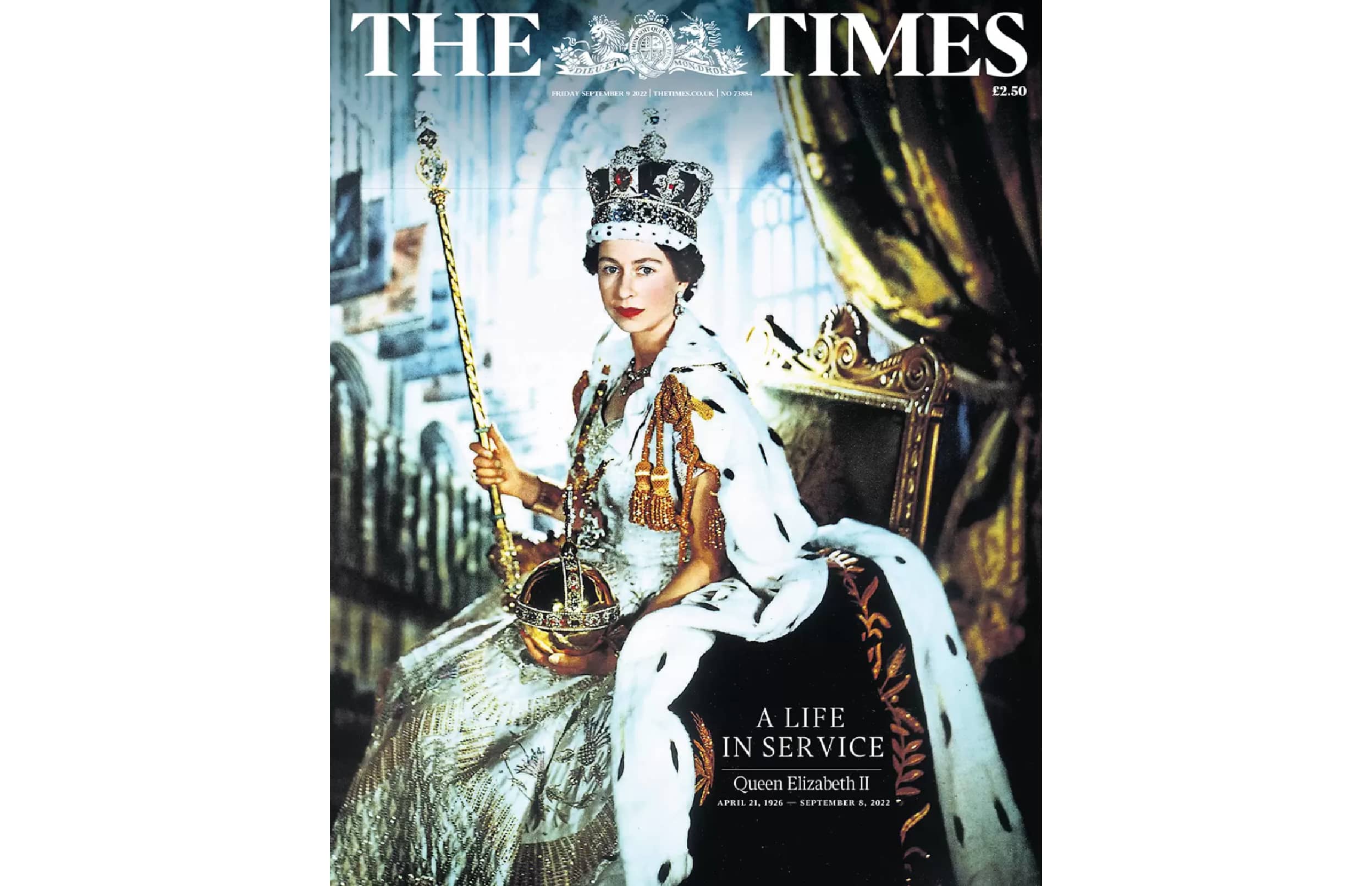
The Guardian has chosen the same picture for their front page – a striking image from the Queen’s Coronation in 1953, when she was just 27 years old.
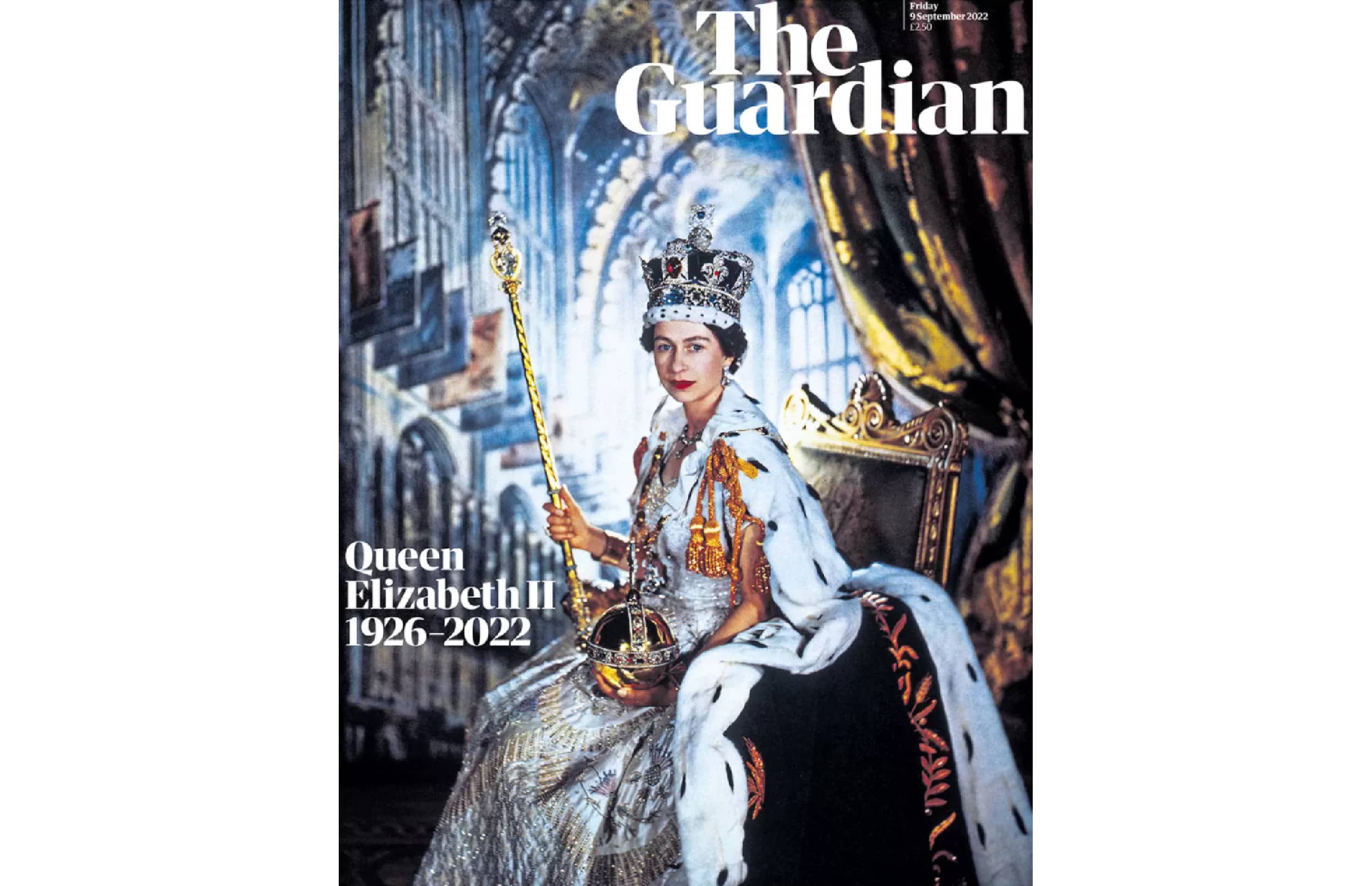
In the Daily Mail, columnist Sarah Vine asks: ‘How to find the words? Our grief is a hundred emotions, all of them hard to grasp,’ and remarks on the double rainbow that appeared over Buckingham Palace after her passing.
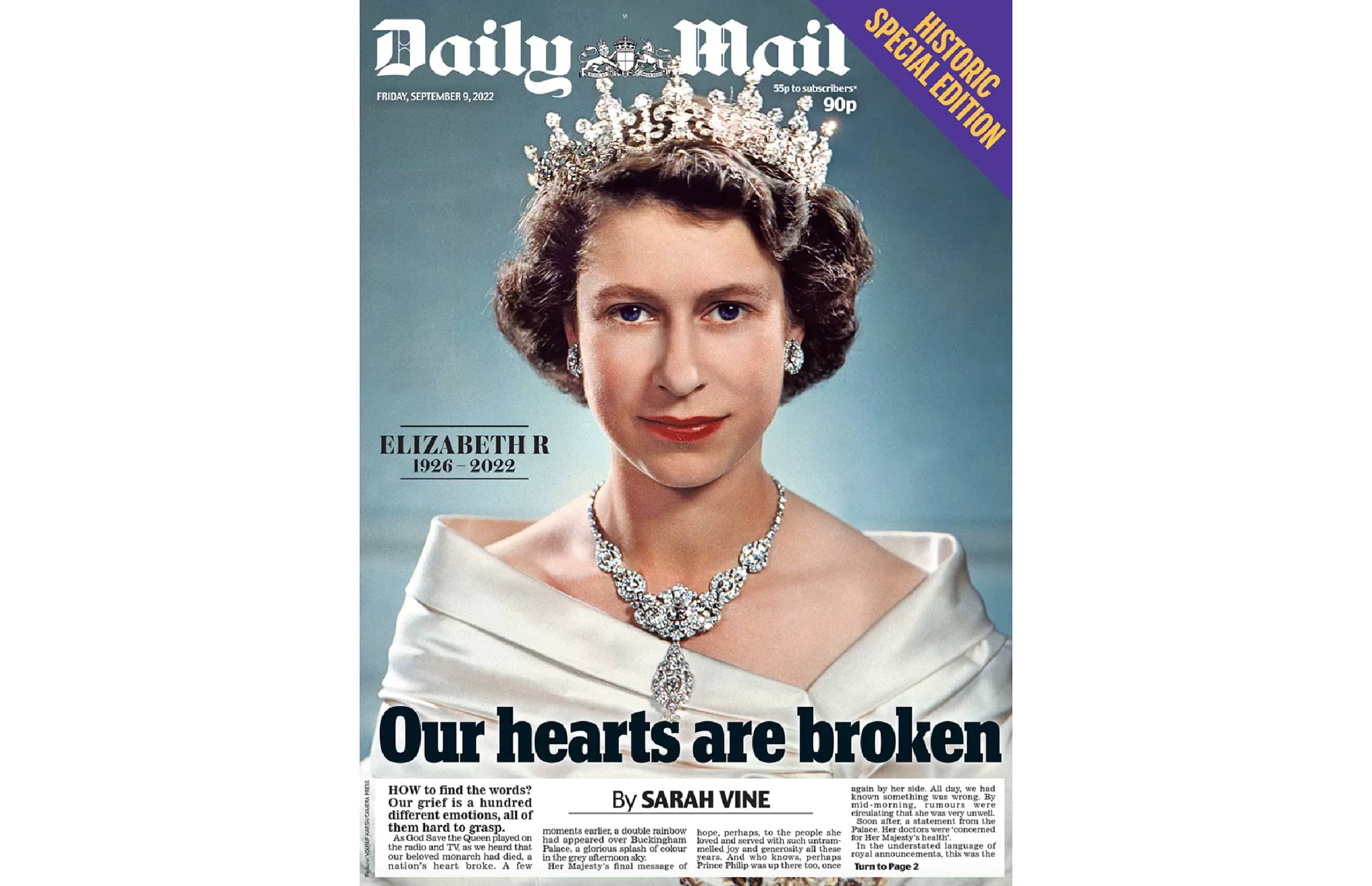
The Daily Telegraph repurposes a phrase spoken by the late monarch as she paid tribute to victims – and families – in the aftermath of the 9/11 terror attack. In his tribute to the Queen last night, President Joe Biden referenced her comment and how she stood with the US in its ‘darkest days’.
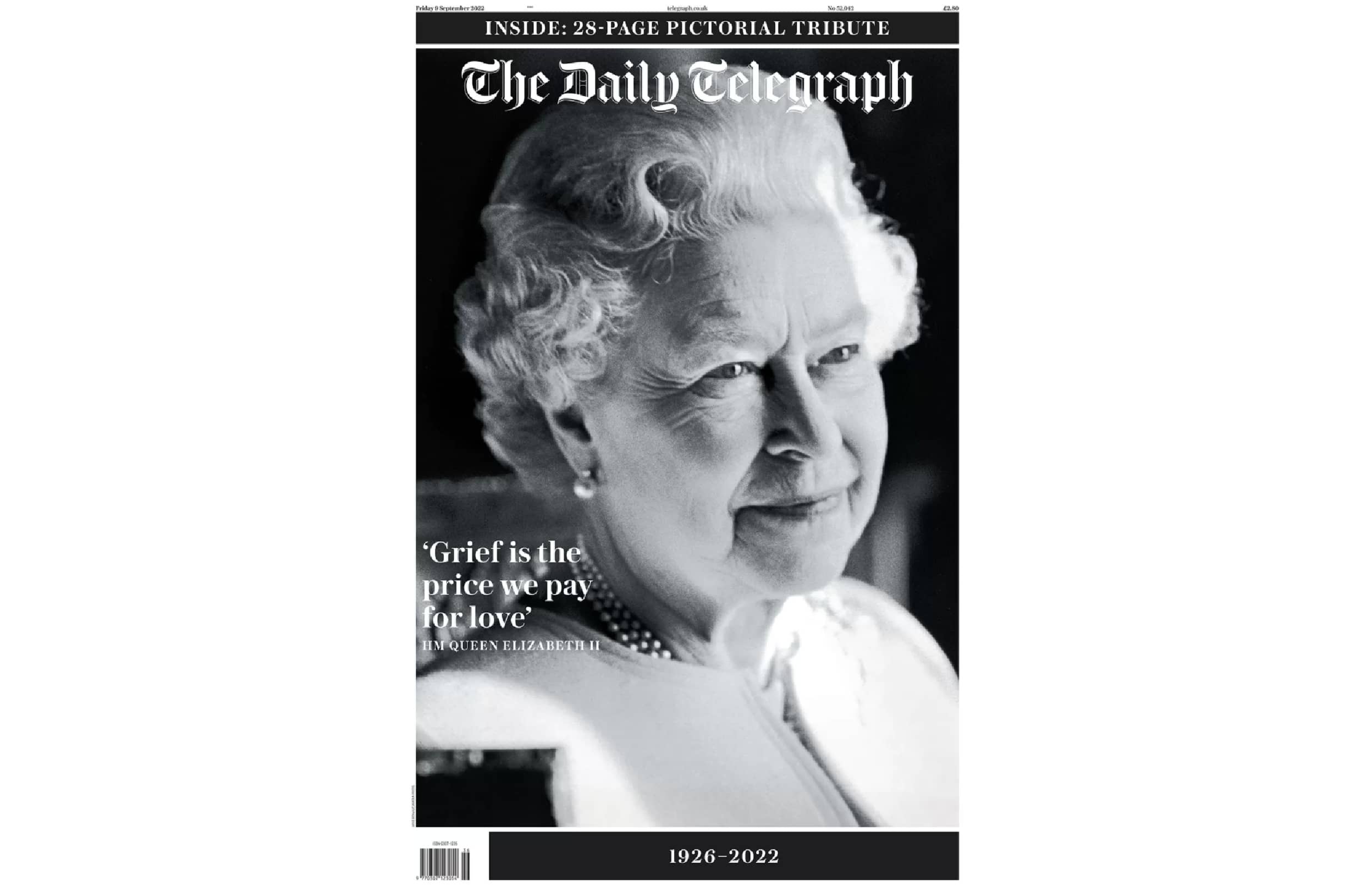
The Financial Times picks a smiling picture of the Queen, in the back of a carriage, for its front page.

‘Thank you’ was the simple message adorning the front page of the Daily Mirror, alongside a more recent picture of the Queen than many other papers have used.
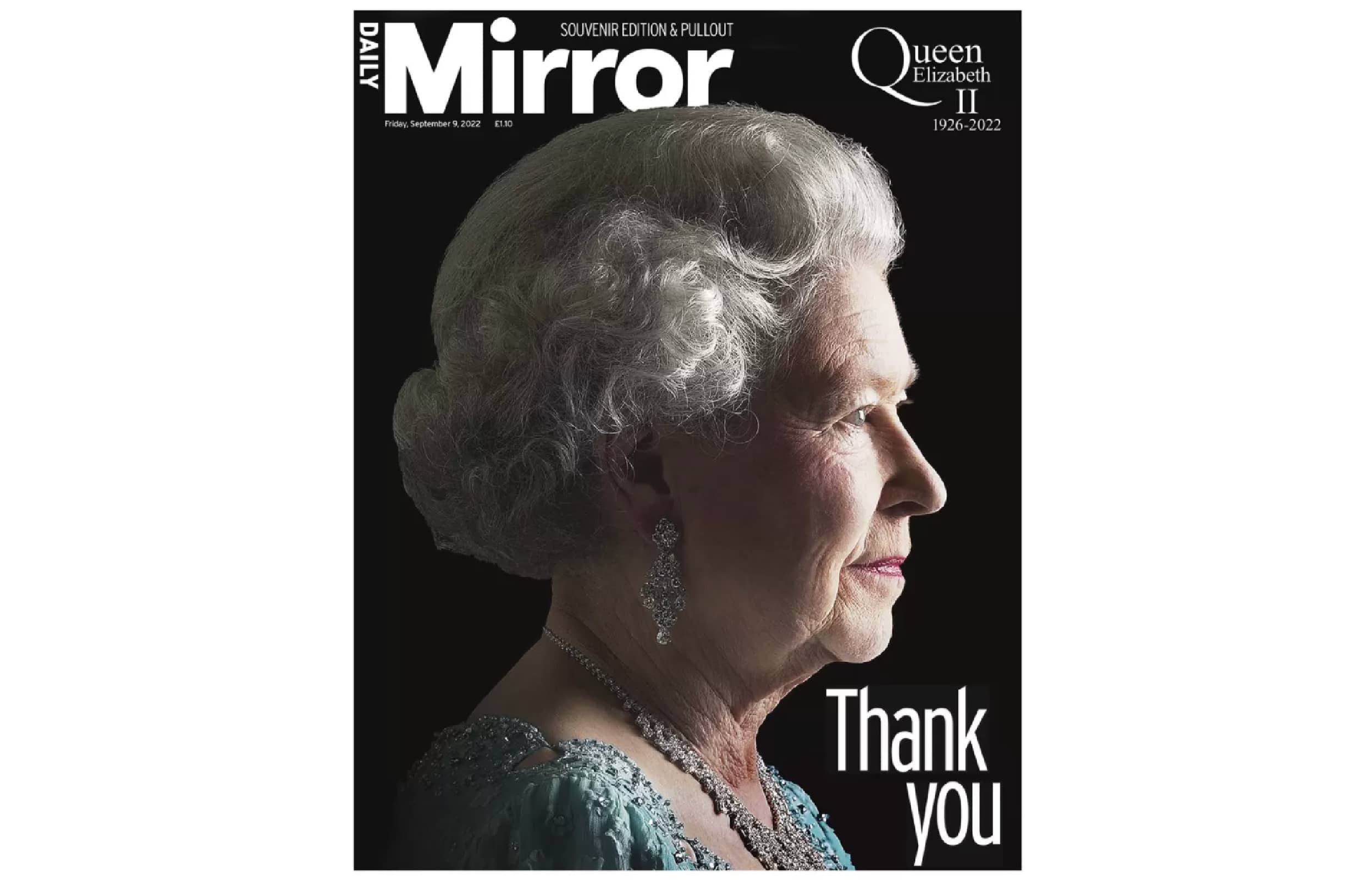
The Sun emphasised the love its readers had for their monarch of 70 years and commemorated her passing with a 36-page special issue.
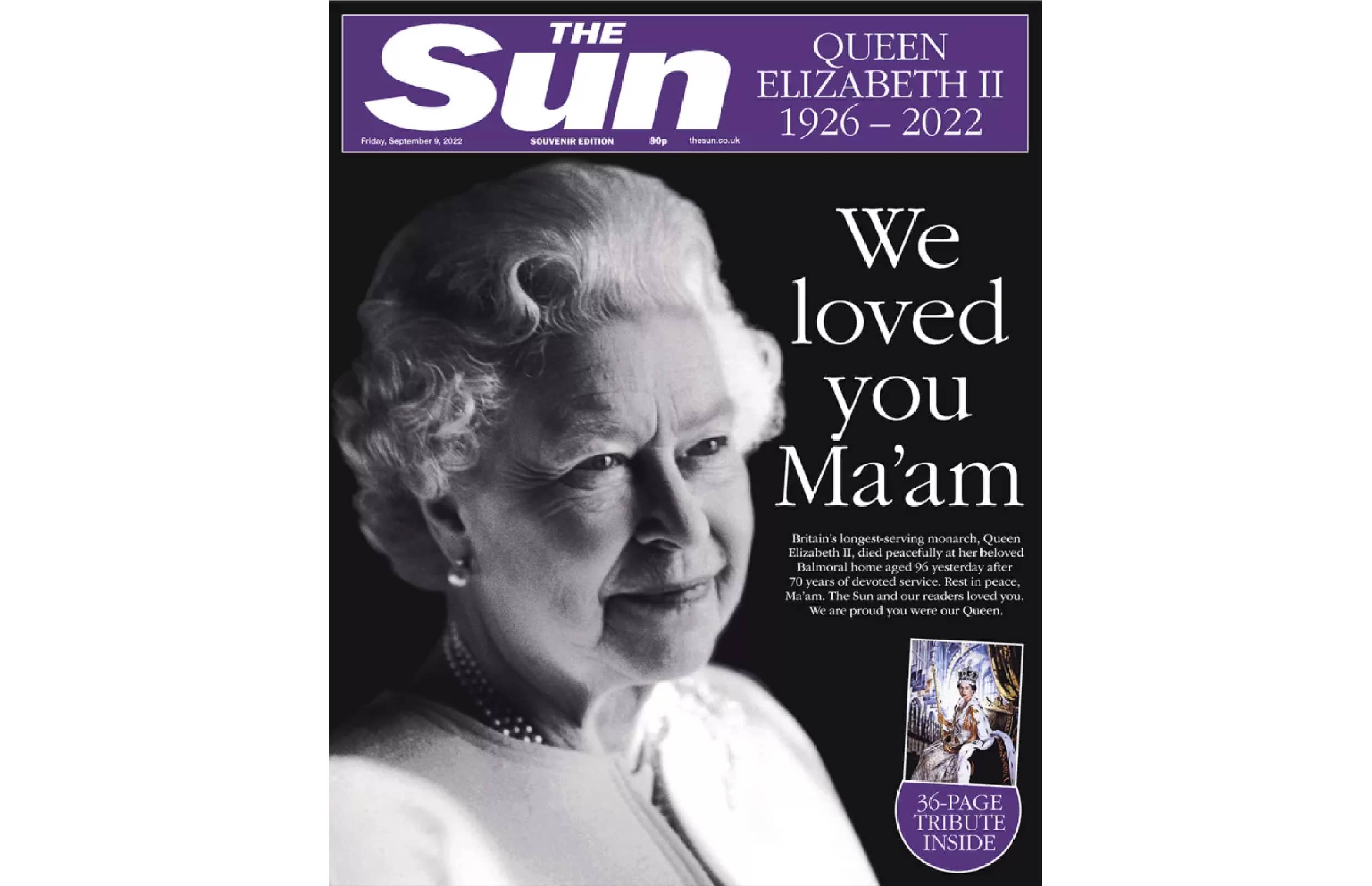
The i took a newsier approach than most papers, telling readers that the nation is set to enter a ten-day period of mourning and highlighting the historic week that has been: ‘UK has a new King and a new Prime Minister within 48 hours.’
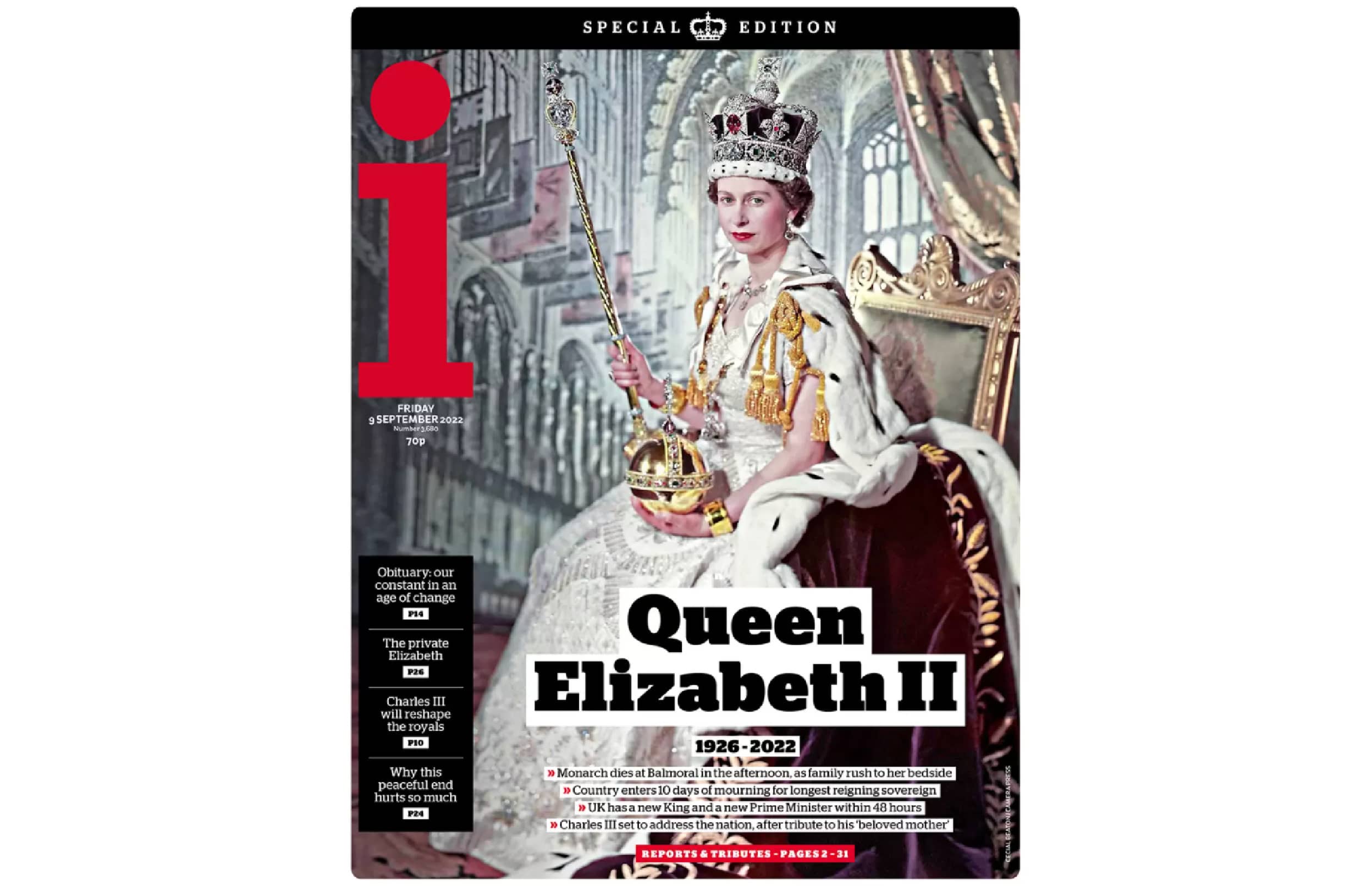
France’s Le Figaro says, simply: ’Farewell to the Queen’.
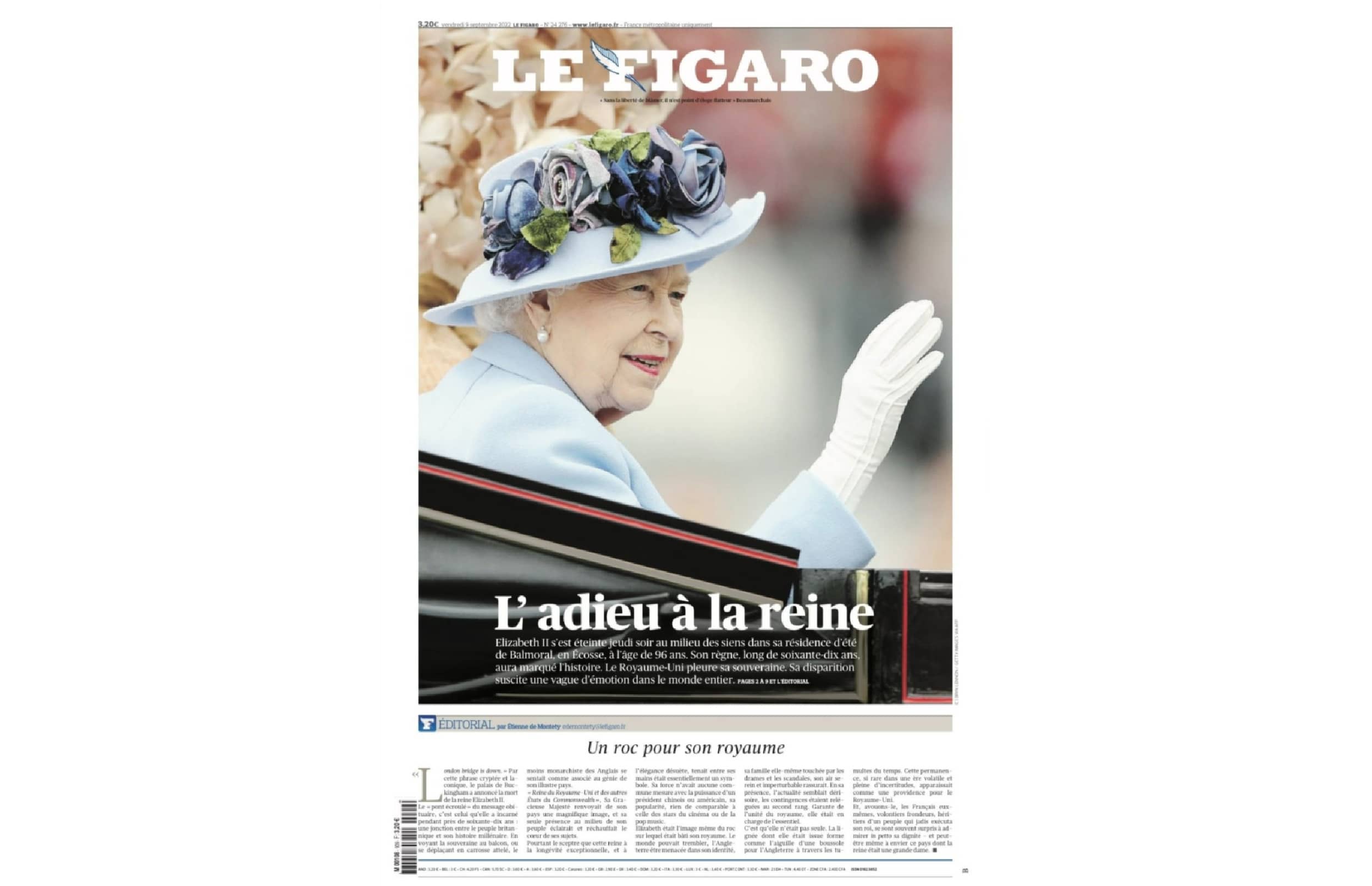
Germany’s Der Spiegel uses a peaceful picture of the Queen with her eyes closed above the headline: ‘The last majesty’.
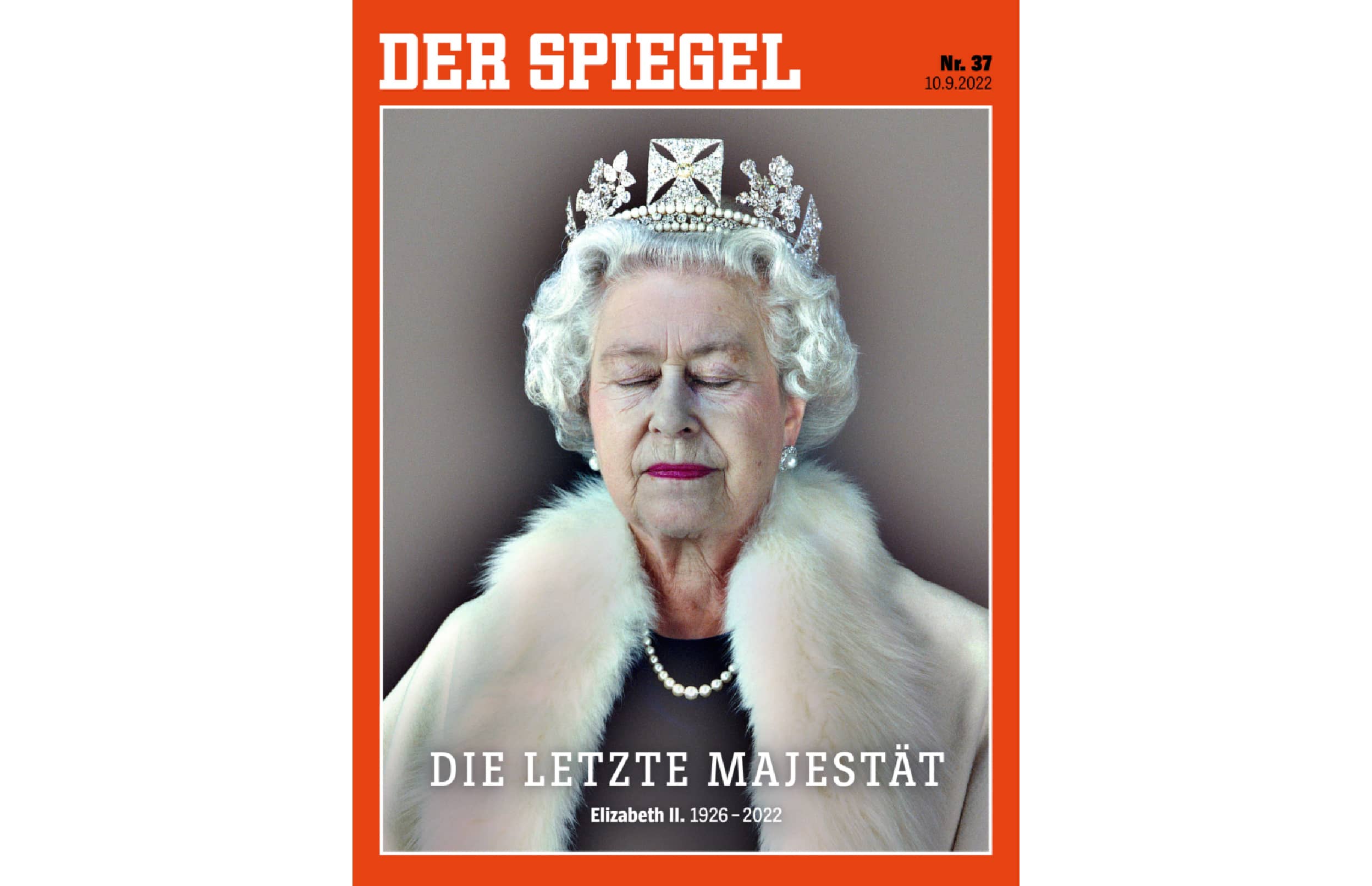
The New York Times highlights the national mourning period and the length of Queen Elizebeth II’s reign, calling her ’the steady hand of a nation’.

And Italy’s La Reppublica hails her as ‘The ultimate Queen’.
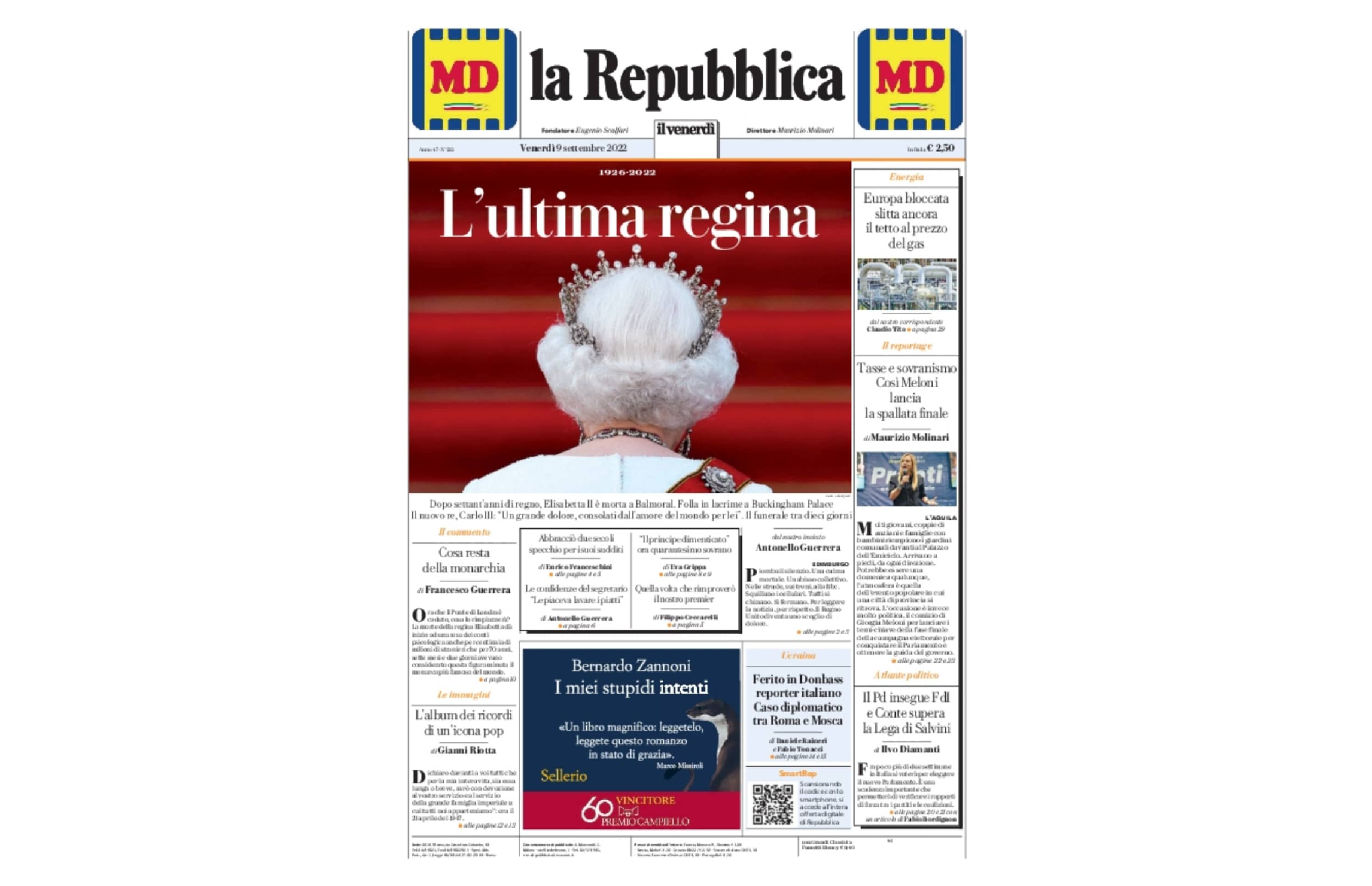
A republican’s tribute to the Queen
I am a republican, always have been, and yet I now feel a great sense of loss. And not only because a 96-year-old mother, grandmother and great-grandmother has died, which is always an occasion for sadness, whether the deceased was a monarch or an ‘ordinary’ member of the public. No, also because Elizabeth II represented something incredibly important. She embodied values that are at risk of extinction. She represented history in an era of anti-historical hysteria, forbearance in a time of narcissism, and public service in an era of self-worship and self-regard.
That was the great irony of Elizabeth II: she was the pinnacle of the establishment and yet she bristled, with every fibre of her being, against the values of the new establishment. She was accidentally countercultural, a traditionalist rebel, and I, for one, loved her for it.
This is the end of an era in so many ways. Most immediately it’s the end of the second Elizabethan age, of the longest reign of a monarch in the history of these isles. But it is also the end of a social, cultural chapter — a chapter I think we will miss more than we know right now.
I will remember the Queen for standing up for stoicism, for resisting the extraordinary and bullying pressure that was put on her following the death of Princess Diana to emote publicly, to advertise her wounds to the watching world. She refused, preferring instead to maintain that dignified and essential distinction between private life and public life, between how one might feel and how one behaves.
This republican says God bless Elizabeth II
I will remember her for representing a connection with the past when we were so often instructed to feel ashamed of the past. For being the personification of history in a time of frenzy, when statues were being torn down, and buildings were being renamed, and shade was being cast upon virtually every era of Britain’s past.
In the midst of this turn against history, the Queen provided people with a connection to yesteryear. She was history made flesh, a quiet one-woman revolt against the idea that the past was entirely terrible and that we must sever all links with it.
And I will remember her for manifesting public service. For devoting her entire life to the nation, the Crown, to an ideal. That cut against so much of the grain of the times we live in; against the instant gratification and shallowness of celebrity culture, social-media preening and identity politics.
Where modern society constantly sends the signal that we should obsess over our own self-esteem and jealously cultivate our own identities, there was the Queen saying: ‘No. I live for something beyond myself. I live for something bigger, something grander, something else.’
You do not have to be a believer in the Crown to recognise the virtue of this, the wonder of it. The Queen was a reminder, a constant reminder, that there is more to life than the self. That folding oneself into a mission or a vision is often a very wonderful thing to do. Our narcissistic era forgets this at its peril.
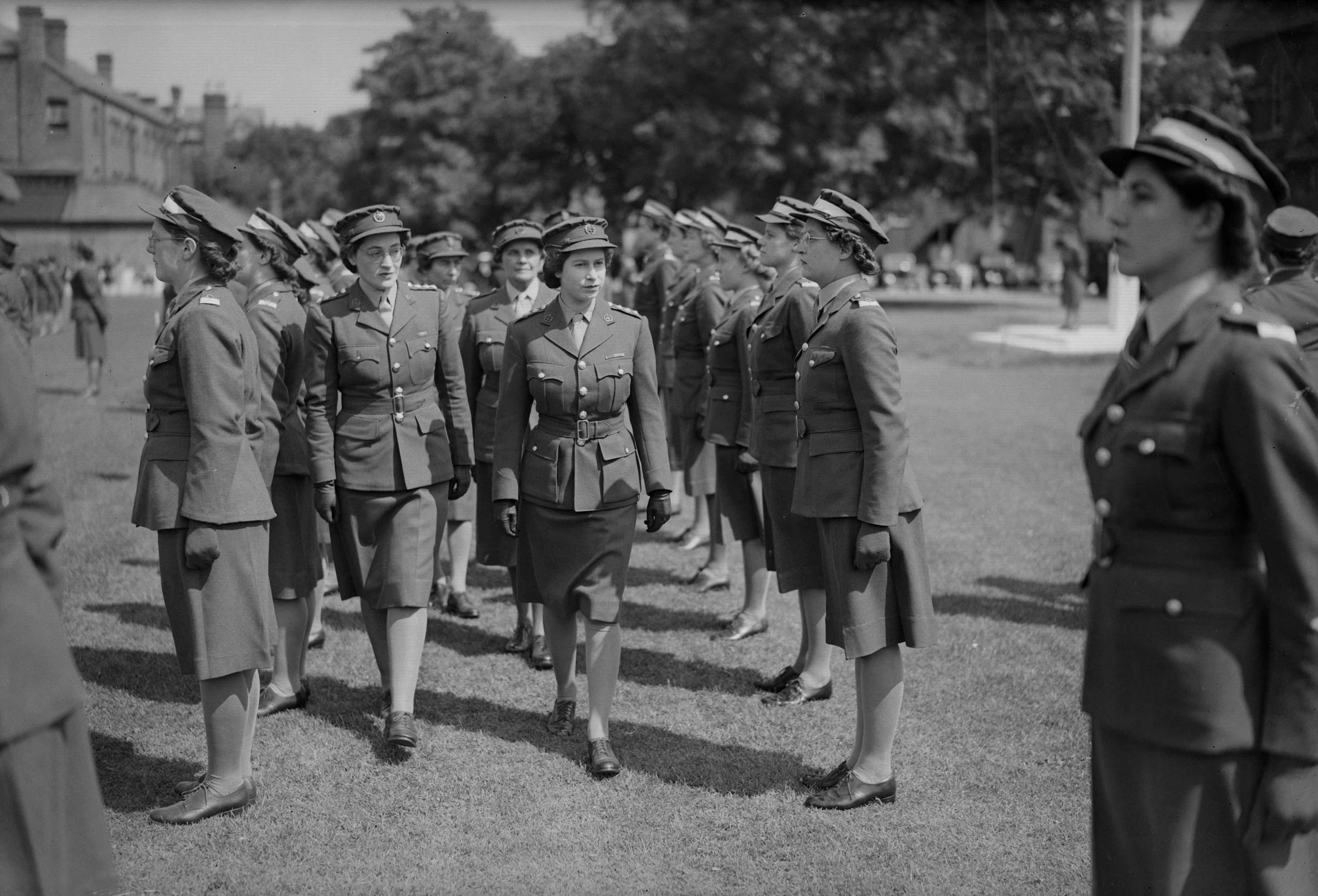
Just behold the images of the Queen. There she is in 1945, volunteering in the war. In 1977, rising above the brickbats of punk. In 1997, resisting the sarcastic tormenting of an elite that wanted her to weep on cue. In 2021, deftly dealing with the Harry-and-Meghan crisis. ‘Recollections may vary’, the Palace calmly said of the accusations of racism in the royal family.
Through it all the Queen kept her counsel, reserved her emotions, and did her duty. That was a Herculean achievement in this era of emotional incontinence. The Queen was an icon not only to monarchists but to all of us who believe that there is virtue in self-sacrifice, emotional control and public duty.
You don’t need a PhD in politics to know why the Queen remained so popular into the modern era. She represented solidity in an era of flux. As the fragmentary creed of identity politics took hold, history was insulted and even everyday language was constantly being overhauled, there was the Queen — calm, constant and always connecting us to something earlier and often something better than our mad 21st century.
So this republican says God bless Elizabeth II. And God bless us all — we will need it in the tumult that is likely to follow the death, not only of an inspirational woman, but also of a way of life. The Queen is dead — Long Live the Queen’s Virtues.
The Queen was the model constitutional monarch
There are events in politics that everyone knows are coming but no one can quite anticipate what they will mean. The death of the Queen is one of these. Her Majesty reigned for 70 years and no MP has served under any other monarch. There is no institutional or political memory of the passing of a sovereign.
The Queen provided continuity through a period of remarkable political, cultural and technological change. Her death removes one of our links to the past. In particular, it severs this country’s most direct link to the wartime generation. When she last stood on the Foreign Office balcony with such determination to watch the wreath laying at the Cenotaph on Remembrance Sunday in 2020 she did so as someone who lived through the Blitz, joined in the VE Day celebrations and married a war hero. She embodied the way in which the country pulled together during that existential threat, the shared sacrifice that had allowed Britain to survive.
The Queen provided continuity through a period of remarkable political, cultural and technological change
It was, perhaps, that connection which meant that despite all the changes during the Queen’s reign, republicanism never became a serious political issue. Another reason is that the Queen performed the role of constitutional monarch to near perfection. She avoided political controversy and even her own ministers did not know her views on many issues. The few times the public had a glimpse of what she really thought – such as the revelations about her worry that Margaret Thatcher was splitting the Commonwealth with her opposition to sanctions on apartheid South Africa and the informed speculation about her sympathy for Euroscepticism – created a stir because they were so rare. Even her intervention before the Scottish independence referendum, her hope that people would ‘think very carefully about the future’, was framed in such a way that it did not come down decisively on one side or the other.
There were missteps. Her talk of an annus horribilis in 1992 was understandable but ill-judged. She failed to understand the national mood in the wake of the death of Princess Diana. Tony Blair’s advice might not have been popular with the royals, but he was right about the need for the family to emote publicly in a way they would not have chosen to do. Considering the country’s heightened emotional state at the time, the situation could otherwise have spiralled out of control.
However, it is remarkable that in the longest reign in our history there have been so few of these mistakes. Queen Victoria, the previous longest-serving monarch, had the bedchamber crisis, which threw her impartiality into question, and her extended withdrawal from public life following Prince Albert’s death. These episodes put Elizabeth’s errors into perspective.
The Queen also had a gift for rising above controversy. She never took on those politicians with republican sympathies in any direct way. Instead, she undermined them with great subtlety. Pauline Prescott, the wife of John Prescott, tells the story of how when the former deputy prime minister was a young MP he declared that he wouldn’t bow to the Queen when she visited Hull. When Elizabeth met him, she spoke very quietly, and he had to lean in to hear to what she said. In the media’s photographs, it looked as if Prescott had bowed and there was no story about the sovereign being snubbed.
The ambiguity about the Queen’s personal views made it easy for her to speak to politicians of all persuasions. By contrast, her son Charles’s views are known on a whole variety of subjects, from the environment to architecture. His allies have long emphasised that he knows that as monarch he will have to be more circumspect about letting his opinions be known. But because so much of what he thinks is on the record, it will colour how his actions are seen. It is striking that during his time as Prince of Wales, ministers could often anticipate what Charles wanted to say to them before he had actually seen them. As king, Charles will have to take a different approach. In part, this is just the challenge of acceding to the throne at 73, not 25.
Charles and Liz Truss are both new to their jobs. They will have to find their own model for relations between a new prime minister and a new monarch. Relations between them are not strained in the way that they had been between Boris Johnson and Charles. But they will both be working out how they want the relationship to function. It will be unprecedented in another way too; it will be the first time a king has had a female prime minister
A few years before Elizabeth became Queen, King Farouk of Egypt observed that: ‘The whole world is in revolt. Soon there will be only five kings left – the King of England, the King of Spades, the King of Clubs, the King of Hearts and the King of Diamonds.’ That there is still a monarchy in Britain, and so many other Commonwealth realms, owes much to Queen Elizabeth. She showed how constitutional monarchy can provide stability and reassurance during a time of great change, how it can foster a sense of national unity that rises above politics, and how it can inspire people through its example of service. She was the yardstick against which every 21st-century monarch will be judged.
Britain will be a lesser nation without the Queen
The loneliest thing about being as long-lived as the Queen, at 96, is that you have few or no contemporaries. Few people reach her age; indeed, not that many people remember the time before she became Queen in 1952, 70 years ago. She has been, simply by living for as long as she did, the one element of continuity in the life of the nation.
In the 70 years of her reign everything changed – Britain just isn’t the country it was then, for better and worse – but the Queen was a constant. Her presence in parliament, at great events, on the BBC on Christmas Day – even on our stamps and currency – gave Britain an extraordinary psychological stability during a period of upheaval.
She was, in her contained and dignified way, a carapace over the nation, an unseen and taken-for-granted, protective presence. It’s something you only notice when it’s taken away. It would be trite to call her the nation’s grandmother, but she fulfilled something of the same function as the oldest member of a family, someone who makes everyone else feel more secure for being rooted in the same soil.
She was a woman of faith; and this faithful servant has now gone to her reward
Like I say, this psychological carapace is only noticed when it’s gone. And what’s surprising is the extent of the shock and grief people have registered – even those you supposed were immune from respect of persons or positions. It’s terrifying in a family when its oldest member dies; it’s the same with the life of a nation when the head of state who has been present in the background of national life for so long, is no more.
‘The King is dead; long live the King!’ sums up the essence of hereditary monarchy: the present incumbent dies, the institution remains. In this case, ‘The Queen is Dead, Long Live the King!’ is not quite as resonant, because something of the institution dies with her: the respect that people gave the monarchy because she was at its head.
It’s difficult to be Queen: the carefully judged words, the perpetual restraint, the essential shyness, constantly conquered, the judgment honed over decades. Yet this impossible role was one Queen Elizabeth aced and made her own. She had views of her own because sometimes she let them slip, but she managed, somehow, to contain them, and to be Queen for the country. Quite what a feat that dignity and restraint was will be seen when we compare her with Prince Charles, who isn’t shy about sharing his opinions and giving way to the promptings of his heart. I’d always thought that she ought, with modern medicine, to outstrip the age of the Queen Mother, or at least make it to 100. Sadly, I was wrong.
As a Vatican spokesman put it not long ago, she was arguably the last Christian monarch, more orthodox in her beliefs than most of the bishops of the Church of which she was Supreme Governor. She never wavered in her faith in the traditional tenets of the Church of England and she never lost a chance of conveying them. Her Christmas messages always conveyed something about the sacred nature of the feast; with equal fidelity, the BBC toned down any reference to it in its summary of the message. Who now represents Christianity to a nation summed up in that dispiriting phrase, ‘of all faiths and none’? She was a woman of faith; and this faithful servant has now gone to her reward.
Britain will be a lesser nation without the Queen. The country could stand taller because this very small woman was its monarch.
It’s ridiculous, isn’t it, to cry when someone you don’t know dies. Yet I cried when I heard the news about the Queen. And the funny thing is, a lot of other people did too.
Requiescat in pace.
I’ve finally learned to love baked cheesecake
I used to be a baked cheesecake sceptic: I didn’t feel they were worth the effort when other cheesecakes required you simply to stir together some ingredients and bung them in the fridge. My thinking was: why waste your time? Was the result really worth the extra effort?
In turns out that yes, it was. It is. I just hadn’t ever eaten a really good cheesecake.
That changed on a visit to San Sebastián. La Viña is a small bar and restaurant serving pintxos (the Basque version of tapas), but it is best known for its ‘burnt’ baked cheesecake. Inside, you feel as though you’re in a cheese shop that has recently suffered a fire: the walls are lined with shelves on which sit rows of cheesecakes, slowly cooling in their charred baking-parchment wrappers. These cheesecakes are crustless, or rather, the baked cheese mixture forms a kind of crust. They are mottled brown on the outside, like Portuguese custard tarts, and slightly sunken in the middle. Not much to look at. But when I bit into a slice, and tasted the silky ivory interior, the caramelised ‘rind’ and the tang of the cheese, I was an instant convert.
Cheesecakes are pretty much as old as cooking itself. In the 5th century BC, they were more rudimentary: fresh cheese was pounded with honey and baked on a griddle. Small cheesecakes were given to competitors during the first Olympic Games in 776 BC. The Romans soon picked up the habit, but added eggs and baked the cakes under hot bricks. When this filling was layered with thin leaves of pastry inside a separately baked crust, it was called placenta – perhaps the first cheesecake that most people today would recognise, although they might mistake it for baklava.
Every country has its own beloved form of cheesecake. The Italians use ricotta and the Germans quark, while Polish recipes call for a local curd cheese called twaróg
Every country has its own beloved form of cheesecake. The Italians use ricotta and the Germans quark, while Polish recipes call for a local curd cheese called twaróg. But it was the invention of cream cheese in the late 19th century in New York that gave cheesecake a spiritual home.
In 1872, while trying to replicate the French cheese Neufchâtel, William Lawrence, a New York dairy farmer, accidentally happened upon a process that produced cream cheese. Within three years, his cheese had become the Philadelphia brand that we know today. (The name was nothing to do with the birthplace of the cheese, but Kraft, which marketed the product, thought that American consumers associated the city of Philadelphia with quality food.)
Quickly, the baked cheesecake became the star dessert at New York institutions such as Reuben’s and Lindy’s. ‘It stands half a foot tall, it measures one foot across,’ was the food writer Clementine Paddleford’s description of the Lindy’s cheesecake. ‘Its top is shiny as satin and baked to the gold of the frost-tinged oak.’
It’s the cream cheese that ensures the smoothness and lightness that distinguishes a proper New York-style cheesecake. A slow, low bake helps, and using a waterbath ensures gentle, even cooking. When it comes to flavours, the body should be unadulterated beyond a little vanilla. My version, channelling Nigella, has an extra sour cream layer on top, which masks any baking cracks and allows you to introduce a little extra flavour. I’ve plumped for malt: malt extract is available in health food shops and some supermarkets, but if you can’t find it, leave it out. Americans use graham crackers for their bases; digestive biscuits are a decent substitute but I’m sticking to my theme and using malted milks.
For serving, anything goes. I like poached cherries, although if you want to tip your hat to British restaurants of the 1980s and 1990s, an under-ripe strawberry and a single spring of mint is the only way. Here I’ve gone all Jackson Pollock, splattering my cheesecake with raspberry and chocolate sauces. What could be more New York than that?
Makes 1 cheesecake (serves 10)
Takes 20 minutes, plus baking/cooling – 80 minutes
For the base
– 150g malted milk biscuits
– 75g melted salted butter
For the cheesecake
– 500g cream cheese
– 150g caster sugar
– 3 large eggs
– 3 large egg yolks
– ½ tablespoon vanilla paste
– 150ml double cream
For the topping
– 1 tbsp malt extract
– 300ml sour cream
– 2 tbsp dark muscovado sugar
- First, prepare your tin. Place a disc of baking parchment in the base of an 8in springform or loose-bottomed rubber-sealed pan. (You need to be able to get the cheesecake out, but not let the water in.) Wrap the outside of the bottom of the pan with oven-safe clingfilm, pulling it taut. Wrap the bottom and sides of the tin with two layers of tin foil.
- Heat the oven to 160°C. Blitz the biscuits to fine crumbs in a food processor or bash with a rolling pin in a sealed bag. Melt the salted butter and stir it into the biscuits, until the mixture resembles wet sand. Pour into the prepared tin and press down with the back of a spoon. Bake for 15 minutes, and set to one side.
- Drop the oven temperature to 130°C. Beat the cream cheese until smooth, then add the sugar and vanilla paste, beating again. Whisk the eggs and egg yolks with a fork, then pass them through a sieve to remove any stringy bits. Add them gradually to the cheese mixture, beating as you go, and stop as soon as they’re combined – don’t overbeat. Heat the cream in a small pan until it’s steaming, and then fold into the mixture.
- Pour the mixture on to the cheesecake base, and place the tin in a roasting dish. Pour boiling water into the roasting dish so it reaches halfway up the depth of the cheesecake. Place in the oven for 1 hour, until the top is firm but retains a gentle wobble.
- Stir together the muscovado sugar, sour cream and malt extract, and pour onto the cheesecake. Bake for a further 20 minutes.
- Remove the cheesecake from the water bath and, once cool enough to touch, remove the tin foil and clingfilm. Run a knife round the edge of the still-warm cheesecake, and leave to cool for an hour, before refrigerating for at least four hours. Bring the cheesecake out of the fridge 30 minutes before serving, and remove from the tin. Serve either with soft fruit or drizzled with your favourite sauce.
Our country’s saddest day
This is our country’s saddest day. In the hearts of every one of us there is an ache at the passing of our Queen, a deep and personal sense of loss – far more intense, perhaps, than we expected.
In these first grim moments since the news, I know that millions and millions of people have been pausing whatever they have been doing, to think about Queen Elizabeth, about the bright and shining light that has finally gone out.
She seemed so timeless and so wonderful that I am afraid we had come to believe, like children, that she would just go on and on.
Wave after wave of grief is rolling across the world, from Balmoral – where our thoughts are with all the Royal Family – and breaking far beyond this country and throughout that great Commonwealth of nations that she so cherished and which cherished her in return.
As is so natural with human beings, it is only when we face the reality of our loss that we truly understand what has gone. It is only really now that we grasp how much she meant for us, how much she did for us, how much she loved us.
As we think of the void she leaves, we understand the vital role she played, selflessly and calmly embodying the continuity and unity of our country.
We think of her deep wisdom, and historic understanding, and her seemingly inexhaustible but understated sense of duty. Relentless though her diary must have felt, she never once let it show, and to tens of thousands of events – great and small – she brought her smile and her warmth and her gentle humour – and for an unrivalled 70 years she spread that magic around her Kingdom.
This is our country’s saddest day because she had a unique and simple power to make us happy. That is why we loved her. That is why we grieve for Elizabeth the Great, the longest serving and in many ways the finest monarch in our history.
It was one of her best achievements that she not only modernised the constitutional monarchy, but produced an heir to her throne who will amply do justice to her legacy, and whose own sense of duty is in the best traditions of his mother and his country.
Though our voices may still be choked with sadness we can say with confidence the words not heard in this country for more than seven decades.
God Save The King.
Queen Elizabeth II: in tributes
Her Majesty Queen Elizabeth II died this afternoon at Balmoral, the royal family confirmed. The gravity of the news has been felt across the world, with leaders offering words of sympathy – and reflecting on a reign that spanned 70 years.
The first of the tributes came from her son Charles – the new King. He wrote, in a statement released by Buckingham Palace:
‘The death of my beloved mother Her Majesty The Queen, is a moment of the greatest sadness for me and all members of my family. We mourn profoundly the passing of a cherished Sovereign and a much-loved Mother. I know her loss will be deeply felt throughout the country, the Realms and the Commonwealth, and by countless people around the world.
‘During this period of mourning and change, my family and I will be comforted and sustained by our knowledge of the respect and deep affection in which The Queen was so widely held.’
Prime Minister Liz Truss, who was installed in her position by the Queen on Tuesday, spoke outside Downing Street this afternoon. She said:
‘We are all devastated by the news we have just heard from Balmoral. The death of Her Majesty the Queen is a huge shock to the nation and to the world. Queen Elizabeth II was the rock on which modern Britain was built. Our country has grown and flourished under her reign. Britain is the great country it is today because of her. She ascended the throne just after the Second World War. Through thick and thin, Queen Elizabeth II provided us with the stability and the strength that we needed. She was the very spirit of Great Britain – and that spirit will endure. She has been our longest-ever reigning monarch. It is an extraordinary achievement to have presided with such dignity and grace for 70 years.’
She seemed so timeless and so wonderful that I am afraid we had come to believe, like children, that she would just go on and on.
Read her tribute in full here.
Former prime minister Boris Johnson wrote on Twitter:
‘This is our country’s saddest day. In the hearts of every one of us there is an ache at the passing of our Queen, a deep and personal sense of loss – far more intense, perhaps, than we expected. In these first grim moments since the news, I know that millions and millions of people have been pausing whatever they have been doing, to think about Queen Elizabeth, about the bright and shining light that has finally gone out.
‘She seemed so timeless and so wonderful that I am afraid we had come to believe, like children, that she would just go on and on. Wave after wave of grief is rolling across the world from Balmoral – where our thoughts are with all the royal family – and breaking far beyond this country and throughout that great Commonwealth of nations that she so cherished and which cherished her in return.’
He ended his tribute with a simple statement: ‘Though our voices may still be choked with sadness we can say with confidence the words not heard in this country for more than seven decades. God Save The King.’
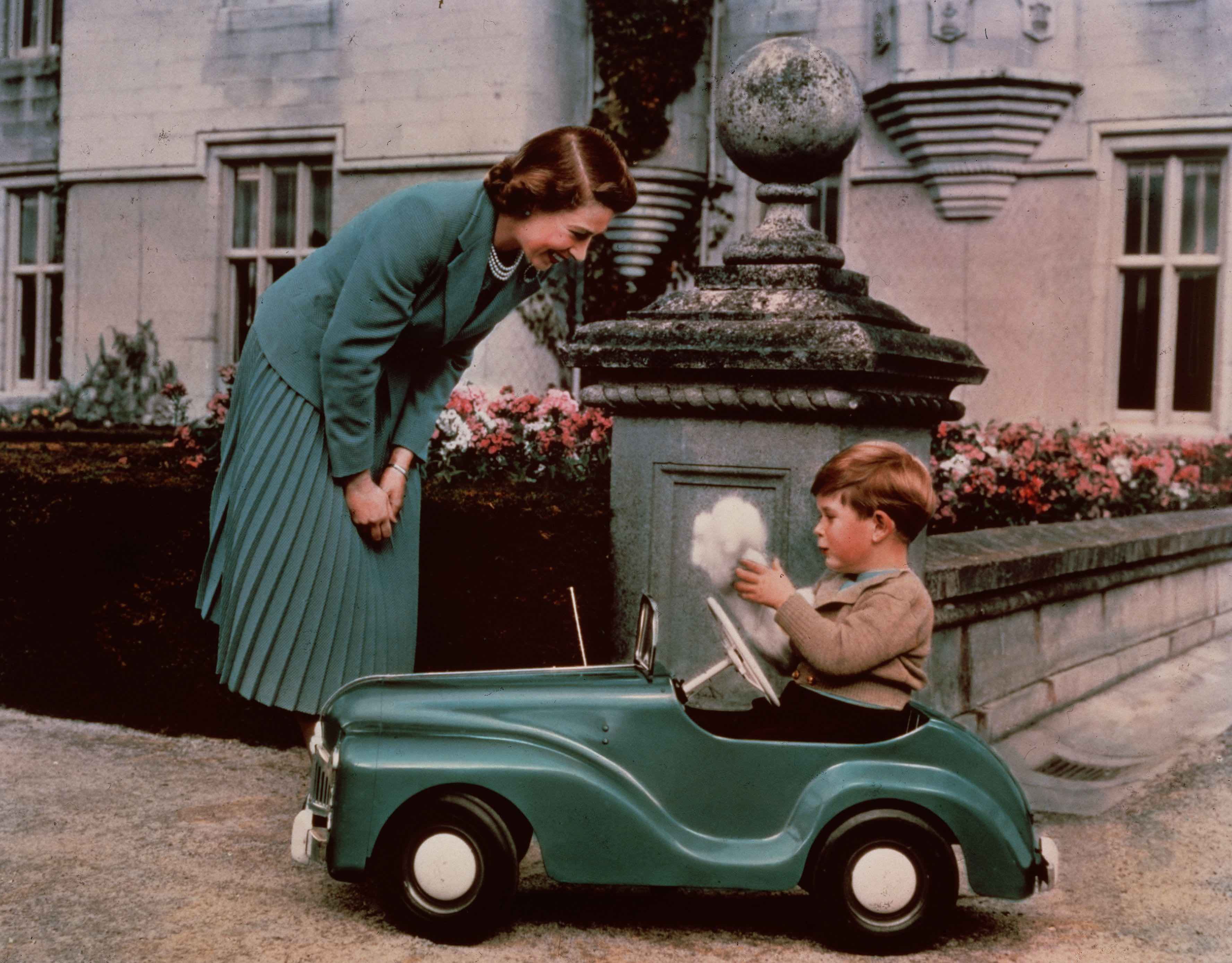
Labour Leader Keir Starmer wrote:
‘Today, we mourn the passive of a remarkable sovereign. It is a deep, private loss for the royal family and all our thoughts are with them at this time. The nation shares in their grief. We will always treasure Queen Elizabeth II’s life of service and devotion to our nation and the Commonwealth; our longest-serving and greatest monarch.
‘Above the clashes of politics, she stood not for what the nation fought over, but what it agreed upon. As Britain changed rapidly around her, this dedication became the still point of our turning world. So as our great Elizabethan era comes to an end, we will honour the late Queen’s memory by keeping alive the values of public service she embodied.
‘For seventy years Queen Elizabeth II stood as the head of our country. But, in spirit, she stood amongst us.’
Joe Biden released a lengthy joint statement with his wife Jill in which he called the Queen ‘more than a monarch,’ adding: ‘She defined an era.’ He also wrote:
‘Today, the thoughts and prayers of people all across the United States are with the people of the United Kingdom and the Commonwealth in their grief. We send our deepest condolences to the royal family, who are not only mourning the Queen, but their dear mother, grandmother and great-grandmother. Her legacy will loom large in the pages of British history, and in the story of our world.’
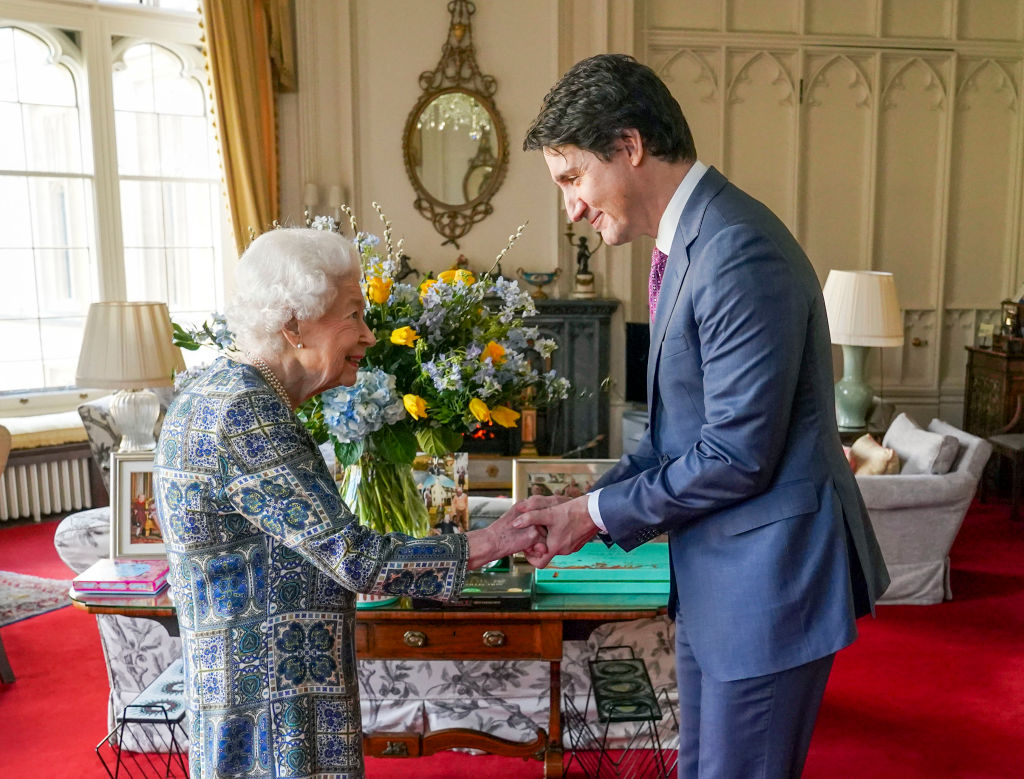
Canada’s Justin Trudeau said:
‘It was with the heaviest of hearts that we learned of the passing of Canada’s longest-reigning Sovereign, Her Majesty Queen Elizabeth II. She was a constant presence in our lives – and her service to Canadians will forever remain an important part of our country’s history. As we look back at her life and her reign that spanned so many decades, Canadians will always remember and cherish Her Majesty’s wisdom, compassion, and warmth. Our thoughts are with the members of the Royal Family during this most difficult time.’
World leaders added their voices to the mourners across the pond. France’s Emmanuel Macron wrote on Twitter: ‘I remember her as a friend of France, a kind-hearted queen who has left a lasting impression on her country and her century.’ Ukrainian President Volodymyr Zelensky added: ‘It is with deep sadness that we learned of the death of Her Majesty Queen Elizabeth II. On behalf of the Ukrainian people, we extend sincere condolences to the royal family, the entire United Kingdom and the Commonwealth over this irreparable loss. Our thoughts and prayers are with you.’
Britain will now enter ten days of mourning
When word of the Queen’s illness spread, the House of Commons quickly emptied. Liz Truss had just announced her fuel bills bailout, one of the most expensive measures in British history. It was about to be eclipsed. The death of the Queen, who appointed Liz Truss as her 15th Prime Minister just two days ago, marks the end of what history will likely judge as one of, if not the most, successful reigns in a millennium of British history. This is where the country’s thoughts will now turn.
The relationship between the country and the Queen is something quite extraordinary, something far beyond the realms or understanding of politics. The mourning will be led not by the Prime Minister but by Charles, our new king, to whom the crown passes invisibly but immediately.
The relationship between the country and the Queen is something quite extraordinary, far beyond the realms of politics
There will be no parliamentary business tomorrow or next week. The Queen’s coffin will lie in repose at Holyrood Palace in Edinburgh followed by a service of reception at St Giles’ Cathedral and is expected to stay there for at least a day so the Scottish public can pay their respects. Charles, Harry and William are expected take their turn standing in a vigil around the Queen’s coffin, known as the Vigil of the Princes. The coffin is then for lying-in-state in Westminster Hall, perhaps on Wednesday, where the public will be able to pay their respects for four days (as happened with the Queen Mother). Meanwhile King Charles visits parliaments in London, Edinburgh, Belfast and Cardiff to receive formal condolences.
Then state funeral takes place at Westminster Abbey. Technically this was to happen ten days after her death, but that’s a Sunday and Buckingham Palace may decide to go a day later. The burial will take place in Windsor later that day for a private burial at the King George IV Memorial Chapel.
Various events (such as the Proms and Premiership matches) have been cancelled but schools will open as normal. Theatre etc continues, after a minute’s silence. The coronation of Charles III won’t be for some time, probably not even this year. The Queen’s coronation came 16 months after her accession with 8,200 guests: King Charles, 73, will likely go for a smaller affair and revise the oaths.
And that’s just Britain. Mourning will not just take place in Britain but the 15 countries for which the Queen was head of state: ceremonies will take place in all of them. When my wife became a British citizen recently I was looking at the immigration packs of other countries. Canada explains to its new citizens why they make an oath of allegiance to the Queen, her heirs and successors: it’s about the present day, they say, not about nostalgia. I found the explanation touching, capturing the power and depth of feeling the monarchy solicits.
‘We profess our loyalty to a person who represents all Canadians – and not to a document such as a constitution, a banner such as a flag or a geopolitical entity such as a country,’ says the welcome pack for new citizens. ‘It is a remarkably simple yet powerful principle: Canada is personified by the Sovereign just as the Sovereign is personified by Canada.’
Every word of this is true for Britain. Elizabeth II was not just liked, but loved: and because her life embodied the notion of service. There will be plenty time, later on, to consider her successor and his prospects. But for now, and for the next few days, the country will pay its respects to a woman who personified it.
We will all miss Her Majesty
When the 25-year-old Princess Elizabeth became Queen in February 1952, the average age at which her subjects died was, at 69, a year shorter than the number of years for which she was to reign over them. Had she herself died at that age, then her reign would still have lasted for 44 years, making her Britain’s eighth-longest reigning monarch, beating her namesake into ninth place by just under a year. Instead, as we all know, Elizabeth II reigned longer than any other British monarch, a full seven years longer than her own great-great-grandmother.
It should be stressed that these statistics are not being presented out of an obsession for record breaking, but rather to indicate the sense of permanence nearly all of us felt about Her Majesty. After all, as fewer than ten per cent of Britons are old enough to dimly remember her father on the throne, in essence, all of us had only been the subjects of just one monarch.
Many of us are feeling genuine grief, because we have lost a woman who was a mother and grandmother to us all
Coupled with that longevity was her ubiquity. Although her mantra was, of course, ‘I have to be seen to be believed,’ her image was also on every banknote, every coin, every stamp, and could be found in countless offices, village halls, schools, army messes, clubs, and hospitals. Indeed, it is almost impossible to spend a day in the United Kingdom without seeing the Queen in some form.
What then, is the effect on a society of living with a head of state who is not only omnipresent, but was, until today, seemingly eternal? And furthermore, what will be our sense of loss?
A cynic might look down upon Britain’s relationship with Elizabeth II, but to do so would be to mistake voluntary adoration with forced adulation. For we all remain free to choose whether we should respect our monarch — there are, after all, no laws that force us to bow or to sing the National Anthem. That so many millions of us did so willingly and without compulsion was not a manifestation of herd instinct, but because each of us as individuals at some point in our lives came to a realisation that Elizabeth was a remarkable woman, who was deserving of our respect, and was for so many of us — and this is no exaggeration — a living embodiment of the spirit of our nation.
Being a living embodiment of anything is a very hard job, and that Elizabeth managed to perform it almost faultlessly is extraordinary. How many other people born in 1926 could have managed it for a month, let alone over seven decades? And of course during that time, the Queen saw profound societal change, and watched and adapted to how we as a nation have come to accept our racial, physical, sexual, and political differences.
Just how tough that has been for her we shall perhaps never fully know. We can only guess, for example, her private thoughts when, in 2012, she shook the hand of Martin McGuinness, who had belonged to the same organisation which had murdered her beloved second cousin, Lord Mountbatten, some three decades before. Rarely did she wear her heart on her sleeve when dealing with such people, although she could be forgiven for hiding behind a bush in the gardens of Buckingham Palace in 1978 than having to exchange pleasantries with her house guest, the brutal Romanian dictator Nicolae Ceaușescu.
There were of course moments of crisis, with 1992 being dubbed by her as her ‘annus horribilis’ — during which her children’s marriages were collapsing, her wealth was being scrutinised, Windsor Castle suffered an appalling fire, and even eggs were thrown at her in Germany because of the British wartime bombing of Dresden.
But she pulled through it, just as she pulled through the death of Diana, Princess of Wales in 1997, although her reticence would see the mob notoriously baying for the Queen to show us that she cared. What that moment revealed was a monarch briefly wrong-footed by societal change, seemingly unaware that many of her subjects existed in a world in which emotion is manifested and not hidden, and feelings are to be shared and not suppressed. It was undoubtedly a moment of deep crisis, but her broadcast to the nation did much not only to show that she did indeed care, but also reminded her subjects that caring and being seen to care ought not to be mistaken.
Now that she has gone — and it still does not seem real — how will we now adapt to the loss? There will be the poignant, and perhaps somewhat jocular moments, such as when we will doubtless get the words to the National Anthem wrong for many years to come. We will miss her at moments of national pageantry, such as the Opening of Parliament, Royal Weddings, and State Visits. When the Royal Family next assembles on the balcony of Buckingham Palace, the lack of her small form will leave a very big hole, and we will instinctively feel that something is awry. None of this is to belittle our King — how strange to write that — but instead to stress just how overridingly essential she became to our public life.
But the sense of loss will be felt on a deeper level. Many of us are feeling genuine grief, because we have lost a woman who was a mother and grandmother to us all. That she died at a grand old age is of course comforting, but we still mourn when we lose someone quite so precious. In a way, we have all now become orphans, and we must adjust to being subjects to a very different monarch.
My beloved mother
The death of my beloved mother Her Majesty The Queen, is a moment of the greatest sadness for me and all members of my family.
We mourn profoundly the passing of a cherished Sovereign and a much-loved Mother. I know her loss will be deeply felt throughout the country, the Realms and the Commonwealth, and by countless people around the world.
During this period of mourning and change, my family and I will be comforted and sustained by our knowledge of the respect and deep affection in which The Queen was so widely held.
